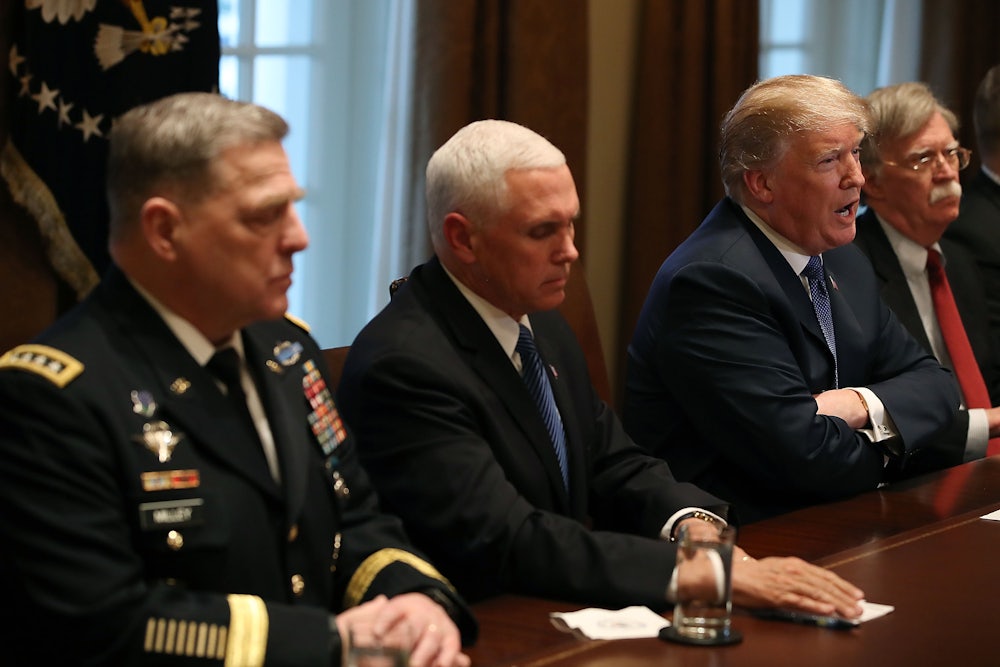For more than a year, President Donald Trump’s advisors and party leaders have been trying, with no success, to change his friendly attitude towards Russian President Vladimir Putin. Now thanks to a chemical weapons attack in Douma, Syria, launched by Syrian tyrant Bashar al-Assad, Trump is finally starting to sour on the Kremlin, tweeting his first-ever presidential words criticizing Putin on Sunday:
Many dead, including women and children, in mindless CHEMICAL attack in Syria. Area of atrocity is in lockdown and encircled by Syrian Army, making it completely inaccessible to outside world. President Putin, Russia and Iran are responsible for backing Animal Assad. Big price...
— Donald J. Trump (@realDonaldTrump) April 8, 2018
At the start of a Monday morning cabinet meeting, Trump said he would “very quickly” be making a decision on how to respond to the Syrian atrocity. Asked if Putin deserves blame for it, the president responded, “He may and if he does it’s going to be very tough, very tough. Everybody’s going to pay a price. He will, everybody will.” With these strong words Trump is playing catch-up with his own government, which has already imposed sanctions against Putin’s country for foreign interference, the most recent round causing the Russian stock market to tumble on Monday.
Many American foreign policy elites have wanted Trump to give up his inexplicable pro-Putin stance. But now that this is finally happening, there’s good reason to fear the return of competition among former Cold War rivals, headed this time by unusually volatile leaders without the safety measures that helped their countries through the twentieth century.
Putin’s success in raising Russia’s international profile despite the country’s economic weakness has given birth to the myth that he’s a strategic mastermind. On CNN last month, Fareed Zakaria described Putin as “the most powerful man in the world.” Surveying Putin’s career, AP claimed he “ transformed Russia’s global image” and looks more “invincible today than at any other time in his 18 years in power.”
But far from a calculating genius, Putin is more properly seen as an opportunistic and reckless gambler. As Keith Gessen observed in the Guardian in February 2017, Putin’s vaunted domestic and foreign policy victories have come at the cost of leaving his country more isolated and unstable. “If this is genius, then it is of a very peculiar kind,” wrote Gessen, predicting a “violent” end to the “Putin era.”
And Putin’s adventurism tends to backfire. In 2016, Mark Galeotti pointed to “the Crimean annexation (which led to sanctions and massive costs to the state treasury), the Donbass adventure (which led to more sanctions and has mired Russia in an expensive, undeclared war), and the Syrian intervention (where Putin backed away from an early withdrawal, leaving him stuck in yet another open-ended war)” as examples of his costly overreach.
Putin has won some daring bets, including one, if one counts allegations of election interference, on Trump winning the presidency. But they’ve come at the cost of stirring up American and European opposition to Russia, whose somewhat uneven and oil-focused economy dooms it to dependent status.
In his willingness to buck traditional diplomacy on desperate gambles, Putin rather resembles Trump himself. And that’s where the true danger lies: in a prestige game between two nuclear powers led by imprudent leaders.
In an interview with Politico, reporter Julia Ioffe, a leading Russia-watcher, points to the similarities between Trump and Putin as a big reason to be fearful:
The reason I’m scared is because, like I said, I think in the Cold War there were kind of protocols and rules developed and lines of communication, and there were just—the way things were done. On the Soviet side and on the Russian side. Now, you have kind of flimsier systems in place. There are fewer rules. And you have two guys, Trump and Putin, who are both painted into a corner, strategically, both at home and geopolitically, who are very prideful. Both very kind of emotional knee-jerk decision makers, to an extent.
To be sure, American-Russian hostility is nowhere near the height of the Cold War, when the world came close to annihilation in confrontations like the Cuban Missile Crisis. But the new hostility also doesn’t have the guardrails that were created during the Cold War to prevent escalation, notably the diplomatic back-channels that President John F. Kennedy and Nikita Khrushchev used to defuse the Cuban Missile Crisis. Given justified suspicion created by the ongoing investigation into possible collusion between Putin’s government and the Trump campaign in the 2016 election, there’s a danger that any attempts at backchannel communication would be seen as criminal.
Nor can traditional avenues of diplomacy serve as a moderating force. Former Secretary of State Rex Tillerson gutted the State Department by forcing out scores of senior diplomats, which means there are fewer experts who can both advise Trump and reach out to their Russian counterparts in the case of an emergency. In any case, Trump has already shown he has little regard for the counsel of the State Department, ignoring officials warnings not to recognize Jerusalem as Israel’s official capital.
Instead, Trump is likely to turn to his newly installed national security advisor, John Bolton, hardly known for his restraint. “Combative, relentless and proudly impolitic,” as The New York Times put it, “Mr. Bolton, the enfant terrible of the Bush administration, has a kindred spirit of sorts in Mr. Trump, a fellow practitioner of blowtorch politics.”
A more combative approach to Russia might well be justified. But Trump, Putin, and Bolton are not statesmen of a judicious persuasion. It remains to be seen whether Congress, reshuffled after the midterms, can serve as a new safety measure in place of the old ones the administration has annihilated.
